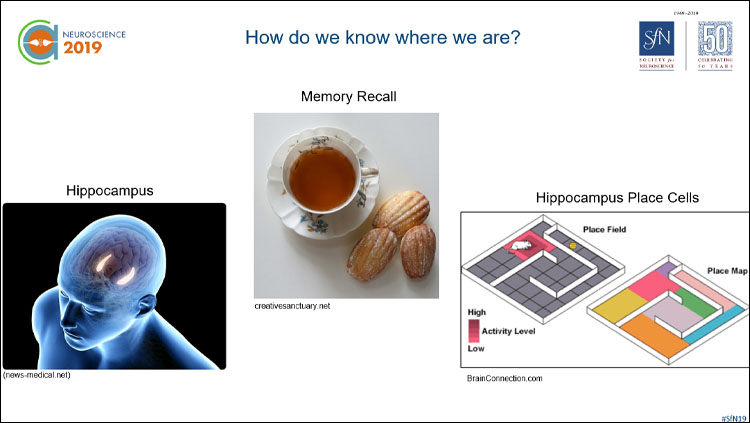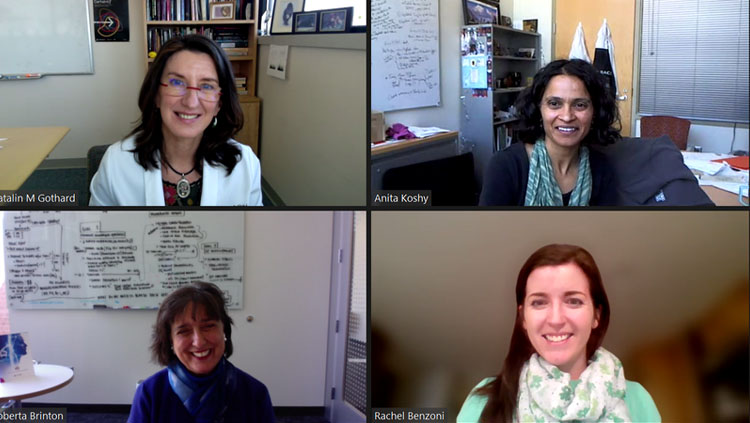Future of Neuroscience: Brielle Ferguson

“Future of Neuroscience” is a series of interviews with rising members of the field. A forward-looking complement to SfN’s “History of Neuroscience” autobiographies, interviewees reflect on their emerging careers and share thoughts on where they believe neuroscience is headed.
Dr. Brielle Ferguson is a postdoctoral fellow at Stanford University. Her research is focused on discovering and better understanding circuits in the brain that support cognition and identifying pathways for intervention in psychiatric diseases and neurological disorders with cognitive impairments. She also is a co-founder and serves as program director for Black in Neuro, an organization that strives to build community, provide resources, and increase visibility for Black scholars in neuroscience-related fields. She hopes to serve as a role-model to aspiring neuroscientists of color through her story, mentorship, and outreach. Brielle has received many awards and honors, including being recently named one of Forbes Under 30 Scientists for her scientific and service contributions to the field.
Neuroscience Quarterly: Why did you choose to pursue a career in neuroscience?
Brielle Ferguson: I have always been fascinated by behavior. In undergrad, I planned to go into psychology. But after volunteering in a clinical psych lab and getting hands-on experience, I realized the questions we could pursue were really cool, but I wanted to be able to go deeper. I ended up taking a neuroscience course and just fell in love with it. I did not even know what I was looking for, but once I ended up in that class, I was like, this is it. I was able to volunteer in that professor's lab and worked closely with a graduate student. I really liked the ability to look beneath the surface and see what's driving our behavior and then explore how that gets disrupted in different diseases. I volunteered in that lab for a summer and that fall I applied to grad school.
NQ: What is your area of research and what drew you to that field?
“… there was a lot of overlap in the circuits that support cognition and the circuits that can become overrun and hijacked to result in seizures. I became interested in why that is, and how the pathology of seizures overlaps with that of cognitive dysfunction in disorders with seizures.”BF: I am still motivated by the same big question that drew me in: what drives our behavior? I would say that focus has narrowed somewhat into what drives our cognition and how does that get disrupted in different disease states? In graduate school, that was in the context of understanding the circuit that supports working memory. But that same circuit can get hijacked, resulting in seizures. That was what drew me to my current lab. I was at a conference and I met my current boss and he shared that this circuit was implicated in seizure genesis. I started looking into it and realized there was a lot of overlap in the circuits that support cognition and the circuits that can become overrun and hijacked to result in seizures. I became interested in why that is, and how the pathology of seizures overlaps with that of cognitive dysfunction in disorders with seizures.
Now I am in a lab that studies absence epilepsy, where patients have these brief periods of unconsciousness. Instead of having convulsive seizures, patients have a loss of motor function. They stop moving and even will stop speaking in the middle of a sentence; this can happen hundreds of times throughout the day. But even when they are not having those absences, they also have cognitive deficits. So that is what my project is now: trying to understand why these patients have cognitive impairments outside of when they're having seizures, specifically their impairments with attention.
NQ: What is something from your career thus far that you are most proud of?
BF: In my graduate school work and what I am trying to wrap up in my postdoc, I found that a particular cell type plays a strong role in cognitive dysfunction, potentially across disease states. That is a story and a project that I think will be impactful. But we know how science works, unfortunately you can discover really cool things but it takes time before they actually reach people and impact their lives.
A close second with the lab work I do is the outreach I have done through Black in Neuro, because I am able to see the tangible benefits of that on a day-to-day basis. People tell me this organization simply existing has made a difference for how they feel about their place in science and neuro. And that not only do they belong, but they can thrive here. That is due to all the incredible organizers, the founder and the president, and all the people that have worked to make that organization a success. That is not something that I alone can take credit for, but my role in that is something that I am very proud of.
NQ: What unique challenges do Black early career scientists face?
“It is really difficult to feel like you can do something when you do not see anyone that looks like you who has done it.”BF: Isolation is one of the biggest challenges. It is really difficult to feel like you can do something when you do not see anyone that looks like you who has done it. I think the internet has helped so much with that because even though there are nowhere near as many of us as there should be, we do exist. And with the internet, we can put everyone in the same space — like what we have done on our website with our profiles — and see that Black people are in these roles.
On top of that, in being the only Black person in these spaces, we often are the only person in our peer groups who is in science. We might not have access to friends or family who have been down this path before and can give us career advice. For example, something that really helps you get your foot in the door in neuro and get accepted to grad school is having research experience. And if you did not have someone tell you to seek that out early, then you could potentially fall behind. That was the case for me. Having cultural access to people who have already taken a path is a huge part of succeeding in that path. And for Black people and other people of color, we tend to not have that.
Another thing would be what we call the “minority tax.” There is this demonstrated pattern of Black people, other people of color, and even women bearing a disproportionate burden of service in academic settings. We are the ones who are most likely to be serving on diversity committees, doing service work, and serving as presidents of organizations that advance our community.
All this work is so important; it is so valuable for our voices to be in the room because we are the ones who this outreach affects. But ultimately, it takes away from research time. Then there are also clear demonstrated patterns of racism in admissions, in hiring, and in grant funding. And so everything compounds on itself to make us dramatically behind.
NQ: How do you hope the field of neuroscience will grow and change? What could make it better?
“We will have to somehow figure out how to de-incentivize the structures that support a lab-focused versus a patient-focused mentality.”BF: I think one of the most powerful things that neuroscience can do is collaborate even more. Neuroscience is a largely an interdisciplinary field: We have people who are working from the individual cell, even protein and molecular level, all the way up to functional imaging in humans. It is almost an untapped strength within neuroscience that we have all these diversities of approaches and levels of analysis. If we were talking to each other even more, we could get closer to bringing the research from the bench to actual human patients. That will involve a shift from thinking, “What is going to be the big story that my individual lab can publish?” to “How can we work together as a collective of scientists interested in the same problem to improve the lives of patients?” But that shift is going to take more than individual scientists wanting to do the right thing. We will have to somehow figure out how to de-incentivize the structures that support a lab-focused versus a patient-focused mentality. The things that make a scientist successful are not necessarily the things that ultimately help people.
NQ: Where do you hope your career will take you over the next few decades?
BF: My broad, long-term goal is to lead a team of researchers studying how the brain supports cognition and how it gets disrupted in different disease states. I am much more familiar with academia but I would not be opposed to doing that type of research in an industry setting. My work has consisted of basic research in mice, which I plan to continue. But I hope to engage in more translational collaborations with people who are working on the same questions across species and levels of analysis.
NQ: What advice do you have for other early career neuroscientists?
BF: Hang in there and believe in yourself. Grad school was a huge wake up call for me; it probably is for other overachievers too. When I could not get experiments to work, I thought that reflected me being bad or not smart. But often issues and failures have nothing to do with you. Sometimes things are just hard. And with most things, if you try enough, you will figure it out. And even if you do not — that is okay. It is not a reflection on you, your intelligence, your determination, or anything like that.
Just know that rejection is coming and it is going to be okay; you will be better and stronger for it.






















